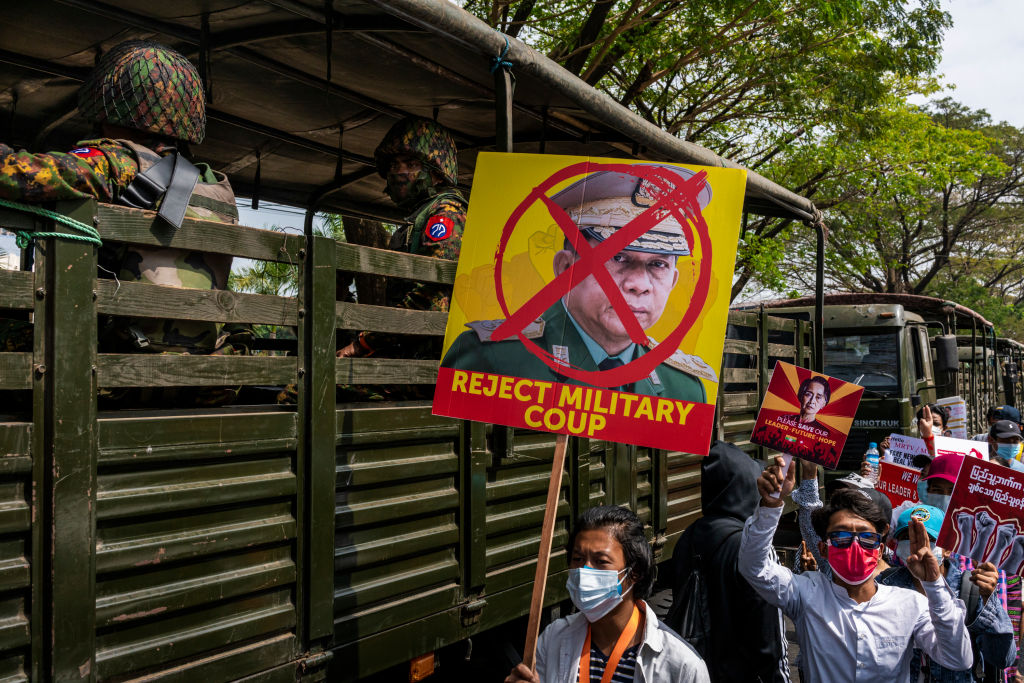
The U.S. imposed new sanctions on senior leaders of Myanmar’s military junta on Monday—the eve of the one-year anniversary of their overthrow of the country’s democratically elected government and imprisonment of its leader, Aung San Suu Kyi.
The U.S., joined by the U.K., and Canada, announced sanctions on officials who helped prosecute Aung San Suu Kyi, the head of the National League for Democracy. The Nobel Peace Prize laureate was arrested in the Feb. 1, 2021 coup. Myanmar courts have sentenced her to a total of six years in prison as of Jan. 10—but she faces additional charges.
Washington also slapped penalties on the scion of the Kyaw Thaung family, who the New York Times reported has strong ties to the Myanmar military and helped it procure equipment. The sanctions also targeted a Myanmar government agency responsible for procuring arms for the military, which is known locally as the Tatmadaw.
But activists and Myanmar watchers say that the targeted sanctions will do little to deter a brutal regime that is increasingly isolated from the West and determined to put down resistance to its rule with violent repression. More than 1,500 people have been killed in encounters with the junta across the country, according to human rights group Assistance Association of Political Prisoners.
“I think it’s fair to say that the West has had little leverage in Myanmar both politically and on the ground since the coup,” says John Nielsen, Senior Analyst at Danish Institute for International Studies and former Danish Ambassador to Myanmar.
Pro-democracy protesters have long called on the international community to find ways to cut off the junta’s revenue streams. And since last year’s coup, several Western firms—including energy giants TotalEnergies of France and Chevron of the U.S.—have vowed to pull business out of Myanmar due to human rights abuses in the country.
Read more: Myanmar’s Artists Are Continuing to Resist from Abroad
Junta leader Min Aung Hlaing and other members of the Tatmadaw were already under sanction by the U.S. and other nations. Human Rights Watch has urged the United Nations Security Council to impose a legally-binding global arms embargo on Myanmar.
But in addition to punitive measures, Burmese exiles say the international community must work to protect people suffering under the junta’s rule. London-based Burmese activist and scholar Maung Zarni says neighboring states should open their borders to Burmese refugees who flee from the Tatmadaw.
They are also wary of dialogue with the military leaders, which neighboring countries including some members of the Association of Southeast Asian Nations (ASEAN), favor. Nay San Lwin, a co-founder of the Free Rohingya Coalition, a global network of Rohingya activists and allies, says many Burmese protesters feel such talks will only serve to cement the coup-leaders’ legitimacy.
Read more: ‘Risking Everything.’ Myanmar Activist Talks About Her Fight
But not everyone is shunning the Tatmadaw. Russia has been criticized for warming up to Myanmar post-coup, continuing to sell arms and its officials attending junta-led events. China also has ongoing dealings with Myanmar, but has taken a more ambivalent stance: It urged ”to restart the democratic process” in the Southeast Asian country while engaging with both the Tatmadaw and ethnic armed forces. “China’s primary objectives in Myanmar is to ensure stability at the borders and get access to the Indian Ocean through an economic corridor from Kunming to Rakhine. They will work with any party in the conflict to accomplish these objectives—and that is in essence what they are doing,” Nielsen says.
Jason Tower, Director for Myanmar at the United States Institute of Peace, says there must be a regional approach to the crisis, as companies closely aligned with the junta operate in neighboring states. If the U.S. and allies can convince Myanmar’s neighbors, including Thailand and India, to crack down on these firms, it could have a dramatic effect on the cash flowing to military leaders.
But the window for such action may be closing. Cambodia has taken over chairmanship of ASEAN in 2022. And Cambodian Prime Minister Hun Sen—no friend of democracy—has given a conditional invitation the Myanmar coup leader. Last year, the nine countries barred the Myanmar junta’s representative from attending its meetings.
Increasingly many activists say they cannot rely on the international community to support their cause of restoring a democratic government in Myanmar. They are putting their faith in ethnic minority militias that have long fought the Tatmadaw, and the People’s Defense Force—an armed group composed of members of Myanmar’s exiled shadow government and pro-democracy protesters. “If we want to be free, we have to fight for ourselves,” says Zarni.
More Must-Reads From TIME
- The 100 Most Influential People of 2024
- The Revolution of Yulia Navalnaya
- 6 Compliments That Land Every Time
- Stop Looking for Your Forever Home
- If You're Dating Right Now , You're Brave: Column
- The AI That Could Heal a Divided Internet
- Fallout Is a Brilliant Model for the Future of Video Game Adaptations
- Want Weekly Recs on What to Watch, Read, and More? Sign Up for Worth Your Time
Contact us at letters@time.com